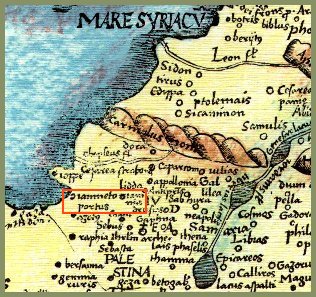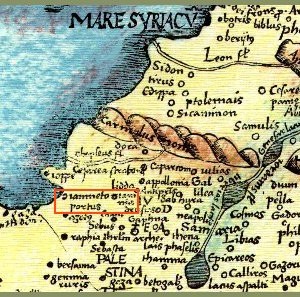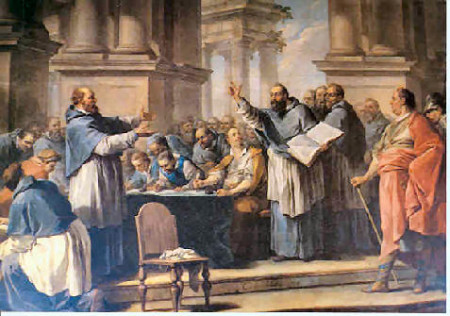A good friend of mine is currently studying to become a Presbyterian minister at Westminster Theological Seminary. Before he left, I asked him two questions:

- Where does the Bible dictate sola Scriptura?
- Where does the Bible dictate the precise canon of Scripture?
- The “Council of Jamnia” Almost Certainly Didn’t Exist: This is a biggie. We know that there was a Rabbinical school at Jamnia, but there’s no evidence that any Council ever occurred there. The “Council” is just a hypothesis put forward in 1871 by Heinrich Graetz, to explain how the Jews ended up with a single canon. As a hypothesis, it’s a very weak one. There are no early sources which speak of a Council at Jamnia. You could just as easily claim that there was a Council in Beijing. For whatever it’s worth, the majority of scholars have finally realized the obvious: there’s no reason to believe that the Council existed.
- It’s Not Clear that the Jamnia School Even Addressed the Canon of Scripture: It’s not just that whatever happened at Jamnia wasn’t a formal Council. It’s that it’s not clear that the Rabbinical school even addressed the question of the canon of Scripture at all. You could just as easily say you get your canon of Scripture from the Peace of Westphalia.
- The Jamnia School Wasn’t Christian: As I said, while there almost certainly wasn’t a Council, there was a Rabbinical “school,” in the sense of rabbis teaching students. After the Destruction of Jerusalem in 70 A.D., the city of Jamnia became the intellectual and religious heart of Rabbinical Judaism. Perhaps needless to say, those Jews who had become Christians weren’t a part of the Jamnia school, so this school included only those Jews who rejected Christ or were somehow unaware of Him. In fact, the Jamnia school is a product of the Pharisees and legalists. This, by the way, is why they didn’t need a Council to produce a canon. The Pharisees had long used the modern Protestant Old Testament. It was the Hellenists, the Greek-speaking Jews, who used the modern Catholic Old Testament, while the Sadducees used only the first five Books of the Bible. More on that here.
- The Jamnia School Was Very Anti-Christian: While we can’t say that the Jamnia rabbinical school ever produced a Biblical canon, we can point to a major contribution of the school. It produced an ugly prayer called the Birkat haMinim, which cursed the Christians as sectarians, and prayed to God that for these “sectarians,” “let there be no hope, and may all the evil in an instant be destroyed and all Thy enemies be cut down swiftly; and the evil ones uproot and break and destroy and humble soon in our days. Blessed art You, LORD, who breaks down enemies and humbles sinners.” This prayer was to be prayed every Sabbath, and it forced the Jewish Christians to stop worshiping with the non-Christian Jews in synagogue.
Prior to this, those Jews who accepted Christ still felt comfortable going to Synagogue, where they would attempt to convert others by speaking of Him as the long-awaited Messiah. For example, this is described as Paul and Barnabas’ regular practice in places like Acts 14:1 and Acts 17:2. After the Birkat haMinim, those days were decisively over. A Christian could pray to the God of the Jews in good conscience, as He’s the God of the Christians as well. But obviously, a Jewish Christian couldn’t ask God to quickly damn the Christians.
I should mention that, for whatever it’s worth, there’s some question about how broadly this curse on “sectarians” was to be interpreted, and likely, different believers prayed the anti-sectarian prayer with different enemies in mind. The Israeli historian Gedaliah Alon, for example, contends “that the Birkat HaMinim may have been directed solely at those Jewish Christians who had adopted an anti-nomian position, thus denying the central tenet of Judaism at the time, covenantal nomism.” No matter. Even if Judaizer Christians were exempt from the curse, it was still viewed as an anti-Christian attack, and Jewish Christians left over it.
- The “Jamnia Canon” May Be the Result of This Anti-Christianity: While it’s not clear that the Jamnia school ever produced a Biblical canon (see #2), there was a push back against the Catholic Deuterocanon, and the Greek translation of the Bible generally, because the Deuterocanon speaks quite clearly of things like Heaven and Hell. It contains astoundingly clear Christological prophesies. For example, Matthew 27:41-43 is clearly written as a fulfillment of Wisdom 2:12-22, in which the Just One was to die a shameful Death (see also Philippians 2:8). By purging Judaism of the Deuterocanon, you could slow the mass movement of Jews into Christianity. This, by the way, is why many scholars who support the idea of some sort of Jamnia canon think that the canon was formed: to purge the Hellenists and the Christians.
- The Early Christians Rejected the Pharisees’ Canon: Given # 3-5, this is no surprise. But it’s still important to remember that we’re not starting from scratch. There were Christians in the late first century, after all, faithful ones, many of who had heard Jesus or the Apostles first-hand. And of course, the Apostle John was almost certainly still alive. And yet here’s what we don’t see: we don’t see Jewish and Gentile Christians saying, “We need to pay attention to what the rabbis in Jamnia decide about which Books belong in the Bible, because their decision will bind us all.” And given that no early Christian used this Old Testament, there’s no question about the right answer.
- The Early Christians Ultimately Produced their Own Canons of Scripture: It’s not as if early Christians were quiet on the question of the canon of Scripture. The North African Council of Carthage, championed by St. Augustine, the hero of Catholics and many Protestants, produced an exact Catholic Bible, Old and New Testament. It was based on an earlier Synod of Hippo who records are lost to time. Pope Damasus I confirmed this canon. This was a gradual process, admittedly, but one in which the Catholic view was upheld, and the Protestant and the rabbinical / Pharisees’ view wasn’t even advanced as an option.
- The Protestant Argument Violates Sola Scriptura: Remember that sola Scriptura says that all doctrines must come from the Bible. The canon of Scripture is certainly a doctrine: one of the most important doctrines, in fact. And yet Protestants advancing this view are deriving this doctrine not from Scripture, but from a Pharisaic tradition. Unless sola Scriptura now means “Scripture plus traditions of the Pharisees,” it’s a massive walking contradiction for Protestants to advance this imagined Council as a way to derive the Books of the Bible.
Of course, the irony here is staggering. Despite all the talk about Galatians, it’s Protestants here who are playing the Judaizers, attempting to force Christians to follow the dictates of an insular group of vehemently anti-Christian Jewish rabbis from the first century. To put it another way, if a Christian in the first century raised the argument that we should reject the Old Testament used by Christians in favor of the one being advanced in the Jamnia school, the followers of St. Paul would denounce them for their legalism. It’s just fundamentally not a Christian answer to the question of the canon of Scripture.


I have faith in the content of the Nicene and Apostles creeds.
There are multiple independent accounts of Jesus effectively claiming to be the Son of God.
That’s great to have faith
but if any person’s faith in men’s creeds of telling you what God’s Means fails….. if any part of them contradicts God’s Word intent it is hollow. ….whether from the Jews or Rc’s or any other source.
That cannot be determined correctly if you blow by Jesus telling us not one jot or tittle passes away until heaven and earth pass away Mat 5:17 THEN assuredly following God’s instructions is NOT for Salvation as it is by breaking them we find the NEED of a Saviour. Then the idea when we accept the gift of grace is to go on and sin no more which is works of FAITH ( James ) and this obedience is for heavenly reward Mat 5 :22. If anyone does not get what sin is from the whole documented First testament you can look at the 2nd testament at 1John 3:4. If any creedal belief ignores Christ it is deficient to build the Kingdom & you choose to become least within it even though you accepted forgiveness. You won’t pass the wilderness test of faithful obedience to go up and posses the land. (Heaven). Christ tells us AGAIN just like for Abraham it is God’s Grace that saves us but faith in Christ teaches us by His Spirit to obey the commandments of the FatherGen 26:5 which ARE spiritual. Rom 7:14
Are we going to be a son of Abraham or a son of the other according to Christ’s Words when we believe mens’ creeds that will not permit us to follow Christ’s example but change the times and days of worship as Daniel prophesied so that even though Freed from our sin debt by Christ’s blood we continue in sin though ignorantly because of blind guides? Just some thoughts
To have faith in the content of the Nicene Creed, as well as the bible, is to (even if unknowingly) accept the tradition of the regional and World Wide councils of the 4th Century Roman Catholic Church.
Here is a link to info on how the creeds originated http://www.newadvent.org/utility/search.htm?safe=active&cx=000299817191393086628%3Aifmbhlr-8×0&q=creeds&sa=Search&cof=FORID%3A9#862
Here is a link to the formation of the Canon of Scripture http://www.newadvent.org/utility/search.htm?safe=active&cx=000299817191393086628%3Aifmbhlr-8×0&q=cannon+of+scripture&sa=Search&cof=FORID%3A9#875
Paul,
I know this is a little late, but your refusal to ‘stoop to the crazy level’ of commenting on Joe’s question regarding the 3000 Jews that accepted Jesus as their Messiah at the feast of Pentecost has officially confirmed to me (and all others readers) of:
a) your intellectual insanity
b) your refusal to consider any opposing arguments on this Jewish question
c) the likely correctness of Joe’s position over yours.
Joe has a credible first century *historian’s* perspective (cf. Luke the fact-gathering Historian) on this Jewish question, and all you have is a wacky 20th century author.
If you can’t accept this, you can’t accept anything. Which is fine!! Just don’t parade that publically.
This comment has been removed by the author.
Jesus said, “Scripture cannot be set aside” (John 10:35). Therefore, all Scripture at the time of Jesus is valid. If after that the Jews removed books, would we? If today the Jews removed books, would we follow suit? There is no perfect logic when we shun part of what Jesus and the Holy Spirit revealed. God bless.
What a monumental waste of time.
First Point: Extra Ecclesiam Nulla Salus.
(Shouldn’t be hard to guess the validity of Jews and their bastard unwanted children the prots from there.)
I still don’t get what did not happen.
Temple gets destroyed. Jews move to Jamnia (Sanhedrin included according to Jewish Encyclopedia). Common sense says they would be trying to squelch the Christians so they yank the books that are not in Hebrew because they provide some pretty solid evidence of Christ.
Did they not, technically produce a canon?
If they did not yank the books, what’s Luther’s logic?
Was there no official “council” thus no official new cannon?
There are obviously (it seems) two cannons floating around at the end of the century (Alexandra and Palestinian). Alexandra canon in the Septuagint. Where did the “Palestinian” canon come from?
oh, one more thing
Whether Jaminia had a council or not, somebody decided not to include the books because they were not in Hebrew but, then someone finds the Dead Sea Scrolls and there they are in Hebrew.
So, not only can Protestants not rely on Jamnia, the given logic (Jamnia’s or Luther’s) is no longer valid.
whether there was a council or not, there was certainly a place named Yavneh. and in 70 AD, when the Romans came and conquered Jerusalem, the people , especially the rabbis went to Javneh. soon there was scholarly activity and Jamnia (Yavneh ) became a centre of spiritual studies. and it held that the canon of the old Testament was brought to a closure here. it was too early still to finalize the New Testament books. please refer Gleason archer. critical introduction to the Old Testament. pages 68-74